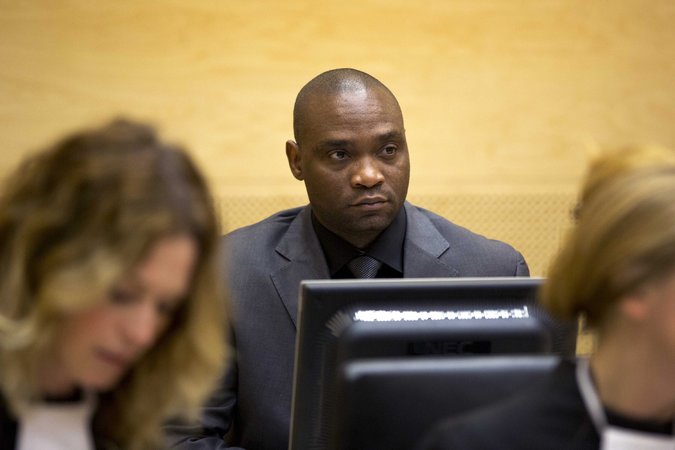
Former Congolese militia leader, Germain Katanga, at the International Criminal Court in Hague.
The International Criminal Court in The Hague sentenced a Congolese militia leader, Germain Katanga, to 12 years in prison on Friday for his role in the attack on a village in 2003 where, within hours, more than 200 civilians were shot or hacked to death, limb by limb.
The court had earlier convicted him of aiding and abetting murder and pillage in the village, Bogoro, in the eastern Democratic Republic of Congo, in 2003. But he was acquitted of charges of rape and the use of child soldiers.
Reading out the sentence, streamed on the court’s website, the presiding judge, Bruno Cotte, said Mr. Katanga had procured the weapons for the attack, including machetes and guns, but that there was no proof that he had personally been involved in the killings. The judge said the militia group he commanded had intended to wipe the village off the map and had carved up its victims.
He was convicted in March by a 2-to-1 vote, but in their sentencing the judges gave him credit for helping to demobilize child soldiers.
Rights groups welcomed the sentence, asserting that it at least provided some degree of accountability for unspeakable crimes that have been committed with near impunity in the Democratic Republic of Congo, one of the world’s most chronic conflict zones.
Géraldine Mattioli-Zeltner, the advocacy director of the international justice program at Human Rights Watch, said in an email from the Ituri region of that country that the sentence offered “a measure of justice for victims of atrocities in Ituri that too often go unpunished. Other armed group commanders preying on the Congolese population should take notice.”
Mr. Katanga is just the second person to be convicted in the decade since the court’s work began. The first was Thomas Lubanga, an adversary of Mr. Katanga in the fighting between militia groups in the Ituri region. Mr. Lubanga is serving 14 years for using child soldiers.
The two cases took years to prosecute and were punctuated by stops and starts and uncertain evidence from witnesses. Lawyers following the court said this reflected shortcomings of the prosecution, but also the difficulty of producing credible investigations of bush wars in remote regions where access is difficult, the fighting is done by irregular mercenaries — sometimes children — and witnesses fear retaliation.
The trial of Mr. Katanga was the court’s first case to hear evidence about sexual violence, including rape and sexual slavery as war crimes and crimes against humanity.
Even though Mr. Katanga was acquitted of those charges, the rights group Women’s Initiatives for Gender Justice, while criticizing that acquittal, said in a statement that the evidence heard had served a purpose because it shed light on the types of war violence committed against women.
The conflict in the Democratic Republic of Congo still has “the highest rate of sexual violence in the world,” the statement said, but the likelihood that the sexual violence crimes, such as those in the attack on Bogoro, will be addressed domestically “is almost zero.”
Another group, Physicians for Human Rights, said earlier that progress had been made because the court, by including the charges, “reminds us just how critical it is to collect, document and preserve forensic medical evidence for these cases to succeed.”
Mr. Katanga’s defense is expected to appeal. But if the conviction and sentence are upheld, he may have to serve only a few more years. He has already been in the court’s custody for almost seven years, which would count toward his sentence.


